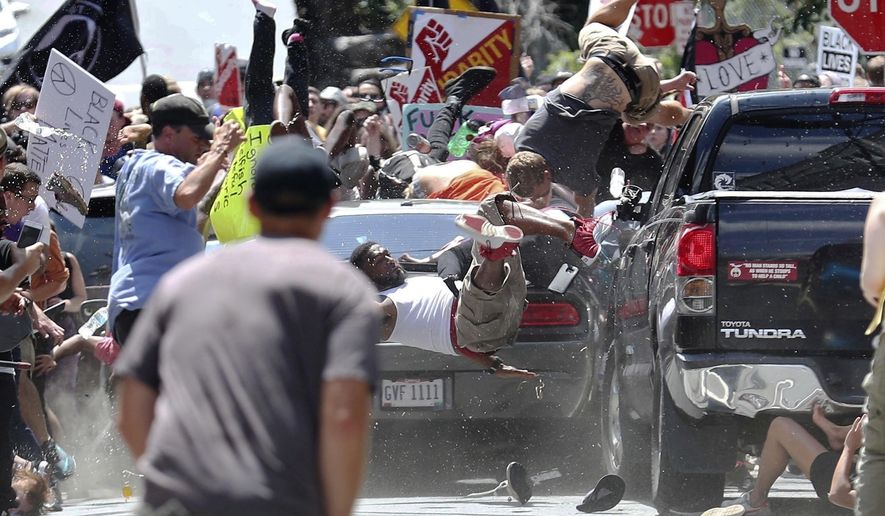A federal judge on Tuesday paved the way for Twitter and GoDaddy to provide records to plaintiffs suing individuals involved in the deadly 2017 “Unite the Right” rally attended by white nationalists in Charlottesville, Virginia.
In an eight-page opinion issued from a federal court in Charlottesville, Judge Norman K. Moon overruled objections raised by Michael Peinovich, a far-right podcast host and “Unite the Right” participant who sought to quash subpoenas issued as part of a civil right lawsuit initiated in the infamous rally’s aftermath.
Also known as Mike Enoch, Mr. Peinovich was among more than two-dozen individuals and organizations sued on behalf of several Charlottesville residents for allegedly conspiring to commit racially motivated violence in advance of the “Unite the Right” rally held on Aug. 12, 2017. He was dismissed from the lawsuit in July 2018, albeit before the court considered his concerns with pending subpoenas previously issued.
Lawyers for the plaintiffs issued subpoenas to Twitter and GoDaddy — in addition to Cloudflare, an internet company, and Hatreon, a defunct crowdfunding platform — in order “to gather evidence related to Defendants’ and their co-conspirators’ coordination of and planning for” Unite the Right.
Mr. Peinovich opposed the subpoenas, and he specifically disputed requests made with GoDaddy and Cloudflare for internet traffic logs related to a far-right blog he runs, therightstuff.biz, covering the weeks before and after “Unite the Right.”
A federal magistrate refused to quash the subpoenas, and Judge Moon, a Clinton appointee, upheld that ruling Tuesday.
“Peinovich’s objections are not well-taken and will therefore be overruled,” he wrote.
Mr. Peinovich told The Washington Times that he considered the ruling to be “irrelevant” because neither GoDaddy or Cloudflare possessed relevant records related to his website.
“Today’s decision allows us to continue to move forward as quickly as possible to gather all of the available evidence demonstrating what they were really doing behind the scenes to plan for the violence, injury and even death that occurred,” said Roberta Kaplan, a co-lead counsel representing the plaintiffs.
“This decision marks yet another step forward in the fight for accountability and justice in Charlottesville,” added Amy Spitalnick, the recently named executive director of Integrity First for America, a legal group representing plaintiffs in the suit. “Integrity First for America is proud to support these brave plaintiffs as we work to send a clear message: racially-motivated violence has no place on our streets and in our communities.”
Mr. Peinovich was listed prominently on promotional material circulated online prior to “Unite the Right,” a rally held in support of a Confederate statue slated to be removed from a park in downtown Charlottesville. The event attracted the participation of far-right extremists from throughout the country, including white nationalists, Klansmen and neo-Nazis, in addition to throngs of counterprotesters and police from across Charlottesville and Virginia.
“Allowing plaintiffs’ subpoenas would cause irreparable harm to Peinovich,” he argued previously, “as visitors to his website would no longer feel that can browse this entirely legal, politically controversial, free speech oriented content without fear of a political witch hunt the likes of which plaintiffs are attempting to carry out through the court.”
The subpoenas seek information about a range of sites and accounts affiliated with various figures involved in “Unite the Right,” including the altright.comwebsite run by Richard Spencer, a prominent white nationalist activist, as well as the personal Twitter messages sent to and from defendants, among other records.
A state of emergency was declared when fights broke out between participants and counterprotesters, and a person was later killed after a “Unite the Right” attendee drove their car into a crowd of counterprotesters. James Alex Fields Jr., a neo-Nazi from Ohio, was subsequently found guilty of murdering Heather Heyer, a 32-year-old local paralegal.
• Andrew Blake can be reached at ablake@washingtontimes.com.




Please read our comment policy before commenting.